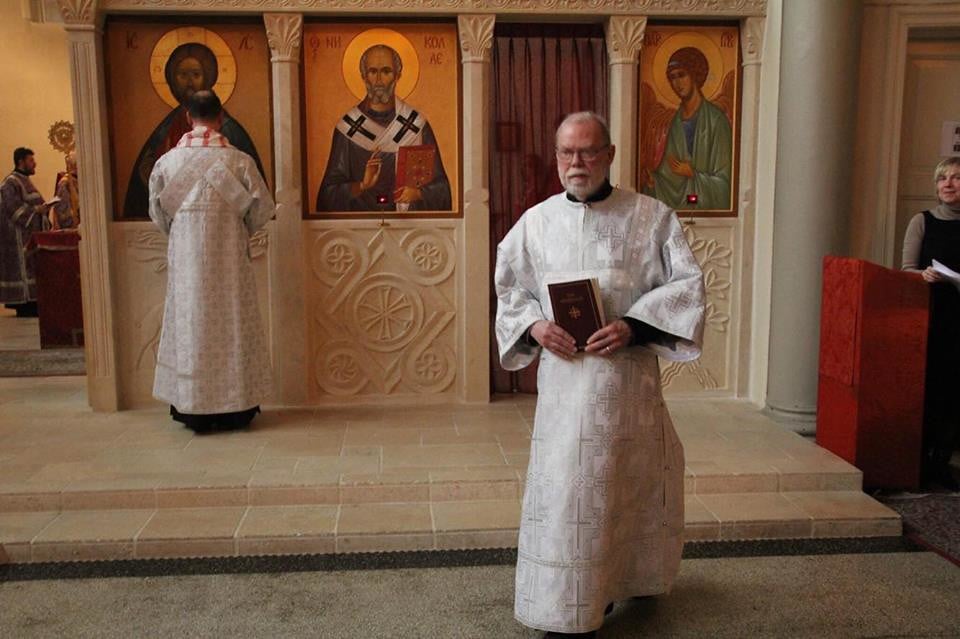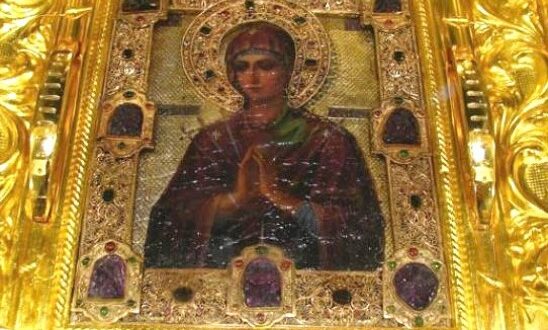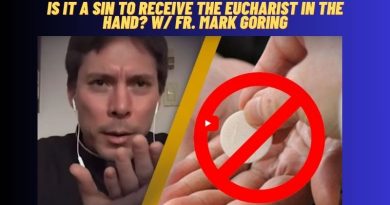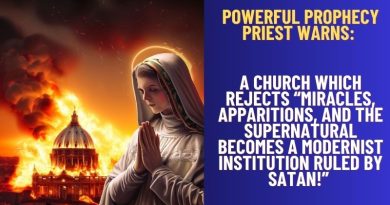The Day Russian Invasion the Icon Began to Bleed Inside Church of the Russian Armed Forces,
The Day the Icon Began to Bleed

On May 2, 1999, an icon of the Theotokos, Softener of Evil Hearts, began to stream myrrh. However, this icon reportedly not only streams myrrh, but reacts to great tragedies. An August 12, 2000 at the time of the sinking of a Russian submarine, small drops of a blood-like liquid began to reportedly stream from the icon. This again occurred on 9/11, and during the Beslan school massacre.
The icon eventually came to the Cathedral of the Resurrection of Christ, located outside Moscow. This church is more commonly known as the Main Church of the Russian Armed Forces, dedicated to the victories of the Russian army. Its walls and windows are decorated with various military imagery, such as soldier saints, and Orders of the Red Army. Most controversially, Stalin and Putin were originally intended for its mosaics.
On February 24, 2022, the Russian armed forces invaded the sovereign nation of Ukraine. The day before was Defenders of the Fatherland Day, a Russian holiday celebrating the armed forces. Patriarch Kirill blessed the troops and said,
We live in peacetime, but we know that there are threats in peacetime. Unfortunately, there are threats at the moment – everyone is familiar with what is happening on the borders of our Fatherland. Therefore, I think that our military personnel, there is no doubt that they have chosen a very right path in their lives.
On March 6, Forgiveness Sunday, the Softener of Evil Hearts icon, stationed in the Church of the Russian Armed Forces, began again to bleed. For many, especially among the Russian Church, this could be a sign that the Mother of God weeps for the losses of Russian soldiers on their heroic “special military operation.” For many others, this blood is a reminder of the thousands of Ukrainians who have bled and died in these last few weeks.
In Kostroma in Russia, on the same day the icon began to bleed, a parish priest named Fr. John Burdin gave a sermon against the war and was reported by a parishioner, arrested, and fined 35,000 rubles. The trial proceedings record Fr. John speaking eloquently, saying
I am not just a citizen of Russia, but also a pastor of the church. And as a pastor, I am responsible for those people who come to my church… Let me try to explain why I thought it was important to read this sermon at all. First, it was said before the liturgy, although it is usually read at the very end. Here I made an exception so as not to force people to pray for what they do not want. That is, I wanted to warn people that I will pray for the conflict that is happening now. As a priest, I see the most terrible thing in the fact that Christian blood is shed now. Both Russian soldiers and Ukrainians (regardless of profession) are all members of the same Church. These are people who could stand in the same room, they are not separated by anything. They are literally brothers and sisters. There can be no lie before God, so I must speak about how I feel at this moment.
And now this blood is shed – and seeing this, I cannot help but feel pain or compassion for those people who are suffering now. And my prayer cannot be ordinary – I cannot lie to God that everything is as it has always been. I warn parishioners that I will pray for [word omitted] to end in Ukraine. … I used the word [word omitted] because neither the Bible nor the Gospel knows any “special operations.” Any conflict that results in aggression and bloodshed is called [word omitted] in the Bible. And I can’t help but pray that it will be stopped.
The word omitted is war.

Patriarch Kirill, meanwhile spoke out the same day the icon began to bleed, to justify the war.
For eight years there have been attempts to destroy what exists in the Donbass. And in the Donbass there is rejection, a fundamental rejection of the so-called values that are offered today by those who claim world power. Today there is such a test for the loyalty of this government, a kind of pass to that “happy” world, the world of excess consumption, the world of visible “freedom”. Do you know what this test is? The test is very simple and at the same time terrible – this is a gay parade. The demands on many to hold a gay parade are a test of loyalty to that very powerful world; and we know that if people or countries reject these demands, then they do not enter into that world, they become strangers to it….
Therefore, what is happening today in the sphere of international relations has not only political significance. We are talking about something different and much more important than politics. We are talking about human salvation, about where humanity will end up, on which side of God the Savior, who comes into the world as the Judge and Creator, on the right or on the left.…
Everything that I say has not just some theoretical meaning and not only a spiritual meaning. Around this topic today there is a real war. Who is attacking Ukraine today, where the suppression and extermination of people in the Donbass has been going on for eight years; eight years of suffering and the whole world is silent – what does that mean?
According to Patriarch Kirill, there may be some doubt as to who is really attacking Ukraine. Is it the Russian armed forces? Or is it the West, who is attacking the traditional values of Ukraine with their “gay parades”?
Several days later, Patriarch Kirill responded to a letter of Fr. Ioan Sauca, an Orthodox priest and Acting General Secretary of the World Council of Churches, asking the Patriarch to intervene on behalf of peace. In this letter, the Patriarch was even clearer in his justification for the war.
As you know, this conflict did not start today. It is my firm belief that its initiators are not the peoples of Russia and Ukraine, who came from one Kievan baptismal font, are united by common faith, common saints and prayers, and share common historical fate.
The origins of the confrontation lie in the relationships between the West and Russia. By the 1990s Russia had been promised that its security and dignity would be respected. However, as time went by, the forces overtly considering Russia to be their enemy came close to its borders. Year after year, month after month, the NATO member states have been building up their military presence, disregarding Russia’s concerns that these weapons may one day be used against it.
Moreover, the political forces which make it their aim to contain Russia were not going to fight against it themselves. They were planning to use other means, having tried to make the brotherly peoples – Russians and Ukrainians – enemies. They spared no effort, no funds to flood Ukraine with weapons and warfare instructors. Yet, the most terrible thing is not the weapons, but the attempt to “re-educate,” to mentally remake Ukrainians and Russians living in Ukraine into enemies of Russia.
Pursuing the same end was the church schism created by Patriarch Bartholomew of Constantinople in 2018. It has taken its toll on the Ukrainian Orthodox Church.
According to the Patriarch, blame for the war lies everywhere except on the shoulders of Mr. Putin or the Russian armed forces. The Patriarch does not condemn the war, but instead repeats nearly every grievance of Mr. Putin. Scarcely is there a word of Christian origin.
One week after the icon began to bleed, after liturgy, Patriarch Kirill gifted another icon of the Theotokos to the leader of the Russian National Guard, Viktor Zolotov, saying “Let this image inspire young soldiers who take the oath, who embark on the path of defending the Fatherland.” Zolotov responded, “We believe this image will protect the Russian army and bring our victory faster.” That same day, a protester in Nizhny Novgorod was arrested for holding a blank sign. Thousands of ordinary Russians have been similarly arrested.
Outside Russia, there was more resistance. The Amsterdam parish of St. Nicholas of Myra decided to stop commemorating Patriarch Kirill in their liturgy, while continuing to maintain communion with the Moscow Patriarchate. In doing this, this parish is following in the footsteps of at least a dozen Moscow Patriarch bishops in Ukraine who have ceased commemorating Patriarch Kirill.
On March 6, the day the icon began to bleed, Archbishop Elisey arrived at St. Nicholas in Amserterdam unannounced, in a car apparently owned by the Russian embassy, partly to attempt to convince the priests to commemorate the Patriarch. The Archbishop told them the Russian Ministry of Foreign affairs had taken an interest in the parish and that they must commemorate the Patriarch. The priests write of this saying,
With this message an important boundary was crossed. Both in the Netherlands and Russia, church and state are separated. Governments are not allowed to interfere in the life of church communities. Then the pressure grew upon our parish. A confused person disrupted the service and smashed a window. Hate messages were spread in Russian-speaking chat groups about our decision. The church was smeared with the “Z” sign of the Russian army.
The parish has since requested release from the Moscow Patriarchate and admission to the Ecumenical Patriarchate.

That same day, Forgiveness Sunday, the day the icon began to bleed, Sister Vassa Larin, a popular writer and nun of the Russian Orthodox Church Outside Russia, spoke out against the war and ROCOR’s complicity, on her youtube, in a Russian language video. Later in an English version of the video, she quoted scripture in saying “Our name is being blasphemed among the gentiles because of us.” She challenged the church, “If we don’t speak then the blood of our sisters, brothers, and their children will cry out to god. Frankly, I think that if we don’t speak, even though the rest of the world is speaking, the stones will cry out.”
Many petitions have begun circulating. One authored by Russian Orthodox Clergy of the Moscow Patriarchate aimed at “ending the fratricidal war in Ukraine,” read,
We are grieving over the ordeal to which our brothers and sisters in Ukraine have been undeservedly subjected. We remind everyone that the life of every human being is an invaluable and unrepeatable gift of God, and therefore we wish that all the soldiers and other military personnel, both Russian and Ukrainian, should return to their own homes and families safe and sound. With great sorrow we contemplate that great gulf which our children and grandchildren in Russia and Ukraine will have to overcome in order once again to befriend, respect and love one another…. In expectation of Forgiveness Sunday we recall that the gates of Paradise are open to all, even to the one who has sinned greatly, if he asks forgiveness of those whom he has humiliated, offended, despised, or even of those who were killed at his hands or by his orders. There is no other path than that of forgiveness and reconciliation. “The voice of your brother’s blood is crying to me from the ground. And now you are cursed from the ground, which has opened its mouth to receive your brother’s blood from your hand”, said God to Cain, who had envied his younger brother. Woe to everyone who recognises that these words are addressed to him personally. No peaceful appeal for peace and an end to the war should be forcibly terminated and regarded as a crime, for according to the divine commandment, ‘Blessed are the peacemakers’.
Laity of the Russian Orthodox Church released a statement as well, directed to Patriarch Kirill. Part of this statement reads,
But now the Body is bleeding as Russian soldiers, among whom there are Orthodox Christians, are killing our brothers and sisters in Ukraine, depriving them of a roof over their heads, undermining their health and welfare, forcing them to leave their homes, stealing the future of an entire country. The most vulnerable – children, women and the elderly- are among the victims of the war. We hear their cries for help and cannot remain indifferent, nor be reconciled with the violence which is being meted out to Ukrainians, Russians and representatives of other nationalities who are unified by a common citizenship and love for their homeland, Ukraine. We appeal to you to fulfil your calling as an intercessor before the authorities of Russia, for your flock which is the victim of military action, for the people who are deprived of their homes and livelihoods.
We also call upon you to send out an epistle to the entire body of the Russian Orthodox Church, and publicly condemn those who support bloodshed. Unfortunately, there are among your flock both clergy and laity who rejoice over war. In the history of the Church, war in the cause of defence has been blessed, whereas war as aggression has always been condemned. Today Russia is the aggressor and the people of Ukraine are having to defend themselves. To pray for the victory of Russian arms, as some clergy are advocating, is immoral.
Another statement was released by some of the most prominent theologians of the Church today, denouncing Russkii Mir, the “Russian World” ideology. This statement presented elements of this worldview, espoused by Mr. Putin and Patriarch Kirill both, accompanied by Christian rebuttals. The statement begins,
The Russian invasion of Ukraine on February 24, 2022, is a historic threat to a people of Orthodox Christian tradition. More troubling still for Orthodox believers, the senior hierarchy of the Russian Orthodox Church has refused to acknowledge this invasion, issuing instead vague statements about the necessity for peace in light of “events” and “hostilities” in Ukraine, while emphasizing the fraternal nature of the Ukrainian and Russian peoples as part of “Holy Rus’,” blaming the hostilities on the evil “West”, and even directing their communities to pray in ways that actively encourage hostility.
These many acts of bravery and resistance, not to mention the many acts of bravery and resitance by ordinary Ukrainains and Russian protesters, bring to mind Metropolitan Philip II of Moscow.

Before becoming a monk, it is believed that Metropolitan Phillip took part in the political life of the state, conspiring with others in the struggle for power. However, it is recorded that one day during a Liturgy, he heard the words of Christ, “you cannot serve two masters,” causing him to give up his life and become a monk. Eventually, he was elevated to be the Metropolitan of Moscow.
As Metropolitan he came into conflict with Tsar Ivan the Terrible. The Tsar abused his power, setting up a secret police that carried out his will. Ivan committed many atrocities, massacres, murders, and thefts using his secret police. Metropolitan Phillip would not tolerate this, and spoke out against the Tsar, confronting and condemning him publicly, refusing to bless the violent man. For this, St. Phillip was killed.
Since the day that Christ was murdered by the state for speaking out against the corruption of the religious leaders of his day, it has been the duty of Christians to speak truth. If we do not, then as Sister Vassa cautioned, blood will, and stones will, and perhaps blood from an icon will.
Conflict has a way of spreading like wildfire. It divides nations, communities, individuals, and our own hearts. We bleed as war rages. Ukrainians bleed, and Russians too. Our Church bleeds as it divides and fractures. And apparently, an icon of the Theotokos bleeds too.
Nicholas Sooy
Editor, In Communion





